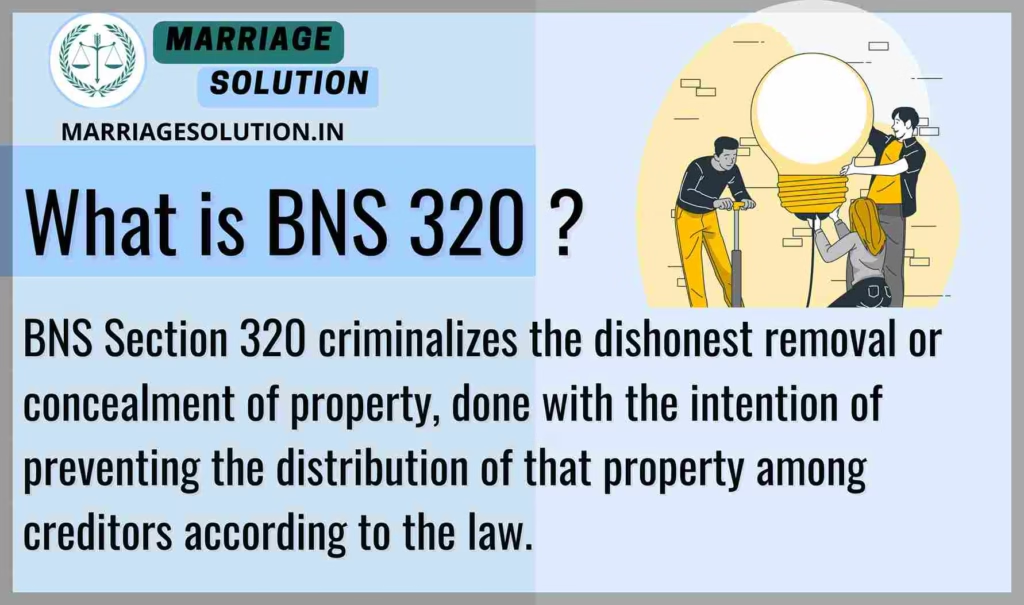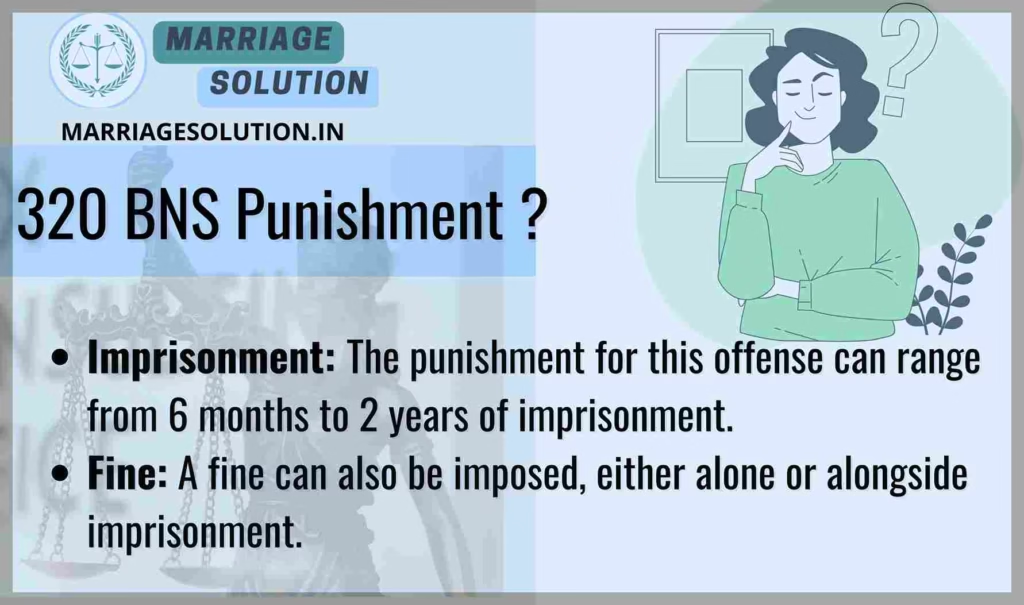Introduction of 320 BNS
320 BNS deals with the dishonest or fraudulent removal or concealment of property to prevent its distribution among creditors. This law safeguards the rights of creditors by punishing debtors who attempt to hide or transfer assets unfairly. By replacing Section 421 of the Indian Penal Code (IPC), the updated provision ensures that financial obligations cannot be evaded through deceptive practices. It directly targets fraudulent transactions, sham transfers, and concealment of property, thereby strengthening trust in debt settlement and financial dealings.
The Bharatiya Nyaya Sanhita (BNS) Section 320 replaces the old Indian Penal Code (IPC) Section 421.
What is BNS Section 320 ?
BNS Section 320 criminalizes the dishonest removal or concealment of property, done with the intention of preventing the distribution of that property among creditors according to the law.

Under Section 320 of the bns act 2023
“Whoever dishonestly or fraudulently removes, conceals, or delivers to another person any property, or transfers it without adequate consideration, with the intention of preventing its lawful distribution among creditors, shall be punished with imprisonment not less than six months and up to two years, or with fine, or with both.”
1. Meaning of Dishonest Removal or Concealment of Property
- This section criminalizes hiding, moving, or transferring property in a dishonest manner to avoid repaying debts.
- It applies when a debtor tries to cheat creditors by keeping property away from lawful distribution.
- “Concealment” includes hiding property in another location or in the name of someone else.
- “Removal” covers secretly shifting property to prevent its seizure by law.
- Fraudulent transfers to friends or relatives without fair value are also included.
2. Who is Covered?
This law applies to:
- Debtors → who try to cheat creditors by hiding or transferring property.
- Family members/relatives → receiving assets knowingly to shield them from creditors.
- Third parties → accepting sham transactions without fair compensation.
- Agents or associates → helping the debtor move or hide property to defeat creditor claims.
3. Nature of the Offense
- Bailable → The accused can apply for bail.
- Non-Cognizable → Police cannot arrest without a warrant.
- Non-compoundable → The case cannot be settled privately between the accused and creditors.
- Triable by Any Magistrate → The case can be tried in any magistrate’s court.
4. Examples of BNS Section 320
- Example 1 – Concealing Assets: A debtor secretly moves gold ornaments to a relative’s house to keep them away from creditors.
- Example 2 – Fraudulent Transfer: A businessman sells his property to a close friend for a token price to avoid creditors seizing it during insolvency proceedings.
- Example 3 – Sham Delivery: A person delivers valuable goods to a third party without fair payment so that creditors cannot claim them.
5. Punishment under BNS Section 320
- Imprisonment: Minimum 6 months and up to 2 years.
- Fine: A monetary penalty may be imposed.
- Both: In serious cases, both imprisonment and fine may be ordered by the court.
6. Importance of BNS Section 320
- Protects creditors’ rights → ensures fair distribution of debtor’s assets.
- Discourages fraudulent transfers → prevents sham sales or hiding of property.
- Strengthens financial trust → promotes honesty in business and personal transactions.
- Provides legal remedy → gives creditors a clear path to challenge dishonest acts in court.
Section 320 BNS Overview
BNS Section 320 defines and punishes the act of fraudulently transferring or concealing property in order to avoid its lawful distribution to creditors. This ensures that individuals cannot evade their financial obligations through dishonest means.
10 Key Points : BNS 320
1. Dishonest or Fraudulent Actions
BNS Section 320 deals with cases where a person hides, transfers, or moves property in a dishonest or fraudulent way. Such actions are not normal transactions but are done with the intention of cheating creditors. For example, transferring property to someone else without proper payment so that creditors cannot claim it. This makes sure that people cannot escape financial responsibilities through fraud.
2. Objective of the Action
The main purpose behind these dishonest actions is to block creditors from getting their lawful share of property. Instead of following legal distribution rules, the debtor tries to escape responsibility. The law targets this intention because creditors must be able to recover what is rightfully due to them.
3. Coverage of the Act
This section applies not just to the property of the offender but also to property related to another person’s creditors. For example, if a person hides property on behalf of a debtor so that creditors cannot touch it, they also become liable. This ensures that no one can help another person in cheating creditors.
4. Punishment for the Offense
If a person is found guilty under this section, the punishment is imprisonment of at least 6 months and up to 2 years. Along with this, they may also be fined, or in some cases, both imprisonment and fine may apply. This flexible punishment ensures the court can decide based on how serious the fraud was.
5. Bailable and Non-Cognizable Nature
The offense is non-cognizable, meaning the police cannot arrest the accused without the permission of a magistrate. This prevents misuse of power. It is also bailable, which means the accused can seek bail from the court and is not automatically detained for long periods.
6. Triable by Any Magistrate
Cases under this section can be tried by any magistrate. This makes the legal process accessible and quicker because creditors don’t need to wait for higher courts. It ensures that justice is delivered without unnecessary delay.
7. Adequate Consideration Clause
The section highlights cases where property is transferred without adequate consideration (fair or reasonable payment). If property is sold at a much lower price than its actual value, only to prevent creditors from claiming it, the act is fraudulent. This prevents sham sales or fake deals made just to escape creditors.
8. Prevention of Creditor Rights Violation
The law is designed to protect the rights of creditors. Creditors provide money, goods, or services on trust, so they must be able to recover debts legally. By stopping dishonest transfers, the law ensures fairness and prevents abuse of financial trust.
9. Scope of the Offense
This offense has a wide scope. It includes not only hiding property but also delivering it to someone else, moving it to another location, or creating fake documents and transactions. Any action that makes it difficult or impossible for creditors to claim their due share comes under this section.
10. Significance of Intent
The most important part of this offense is intention. The court must be satisfied that the accused acted with the intention or knowledge that their action would cheat creditors. If there was no dishonest intention and the transaction was genuine, then it is not punishable. Proving intent separates real fraud from genuine transactions.
Examples
- Concealing Property to Evade Creditors:
A debtor shifts valuable gold ornaments to his relative’s house so creditors cannot seize them during settlement. This act falls under BNS 320. - Fraudulent Transfer of Assets:
A person sells a property worth ₹50 lakh to a close friend for only ₹5 lakh, just to keep it away from creditors. This is a fraudulent transfer under this section.
BNS 320 Punishment
- Imprisonment: The punishment for this offense can range from 6 months to 2 years of imprisonment.
- Fine: A fine can also be imposed, either alone or alongside imprisonment.

BNS 320 bailable or not ?
BNS Section 320 is bailable. The offense is non-cognizable, which means an arrest cannot be made without a warrant. A person accused under this section can apply for bail.
Comparison: BNS Section 320 vs IPC Section 421
| Section | Offense | Punishment | Bailable / Non-Bailable | Cognizable / Non-Cognizable | Trial By |
|---|---|---|---|---|---|
| BNS Section 320 | Fraudulent removal or concealment of property to prevent its lawful distribution among creditors. | Imprisonment not less than 6 months and up to 2 years, or fine, or both. | Bailable | Non-Cognizable | Any Magistrate |
| IPC Section 421 (Old) | Dishonestly or fraudulently removing or concealing property to prevent distribution among creditors. | Imprisonment up to 2 years, or fine, or both. | Bailable | Non-Cognizable | Any Magistrate |
BNS Section 320 FAQs
What does BNS Section 320 criminalize?
BNS Section 320 criminalizes the fraudulent removal or concealment of property with the intent to prevent its distribution among creditors. It covers situations where property is moved, concealed, or transferred without adequate consideration to avoid legal debt obligations.
What is meant by “adequate consideration” under Section 320?
“Adequate consideration” refers to a fair value exchanged in a transaction. If property is transferred or concealed without receiving a reasonable or fair return, this can be considered fraudulent under Section 320.
What is the punishment for committing an offense under Section 320?
The punishment for violating BNS Section 320 is imprisonment for a term not less than six months, but which may extend up to two years, or a fine, or both, depending on the court’s discretion.
Is BNS Section 320 a bailable offense?
Yes, BNS Section 320 is a bailable offense. This means that an individual charged with this offense can apply for bail after being arrested.
Is BNS Section 320 a cognizable or non-cognizable offense?
BNS Section 320 is a non-cognizable offense, which means that police cannot arrest the accused without a warrant. The case must be investigated based on a complaint filed with the authorities.
Who can try cases under BNS Section 320?
Cases under BNS Section 320 are triable by any magistrate, meaning the case can be heard in a magistrate’s court, and there is no need for a specific court or jurisdiction for this offense.
Conclusion
BNS Section 320 is an important safeguard against fraudulent activities that deprive creditors of their rightful claims. By penalizing those who deliberately conceal, transfer, or undervalue property to evade debt repayment, this provision promotes honesty in financial dealings and protects the integrity of the legal system. The law prescribes imprisonment from 6 months to 2 years, or a fine, or both, ensuring that offenders are held accountable. As a bailable and non-cognizable offense, it allows fair procedure while still empowering creditors to take action. For anyone facing such disputes, timely legal guidance is crucial to secure creditor rights and prevent further losses.
Need Legal Support?
If you are dealing with court cases, marriage problems, or any other legal issue, our team at Marriage Solution – Lawyer Help is here for you. Simply fill out our quick online enquiry form, and we’ll connect you with the right legal expert to support your needs.
Finished with BNS 320 ? Continue exploring the next provisions of the Bharatiya Nyaya Sanhita (BNS), 2023. Each section includes explanations, examples, and plain-language breakdowns for easy understanding.
Of Fraudulent Deeds And Dispostions Of Property .
- 320 BNS : Dishonest or fraudulent removal or concealment of property to prevent distribution among creditors.
- https://marriagesolution.in/bns_section/320-bns/
- BNS 321 :Dishonestly or fraudulently preventing debt being available for creditors.
- https://marriagesolution.in/bns_section/bns-321/
- 322 BNS : Dishonest or fraudulent execution of deed of transfer containing false statement of consideration.
- https://marriagesolution.in/bns_section/322-bns/
- 323 BNS : Dishonest or fraudulent removal or concealment of property.
- https://marriagesolution.in/bns_section/323-bns/
Of Mischief
- 324 BNS : Mischief.
- https://marriagesolution.in/bns_section/324-bns/
- 325 BNS :Mischief by killing or maiming animal .
- https://marriagesolution.in/bns_section/325-bns/
Full IPC Section List: https://marriagesolution.in/ipc-section-list
All Indian Law & Blogs: https://marriagesolution.in/indian-law/
Full BNSS Section List: https://marriagesolution.in/bnss_section-list
